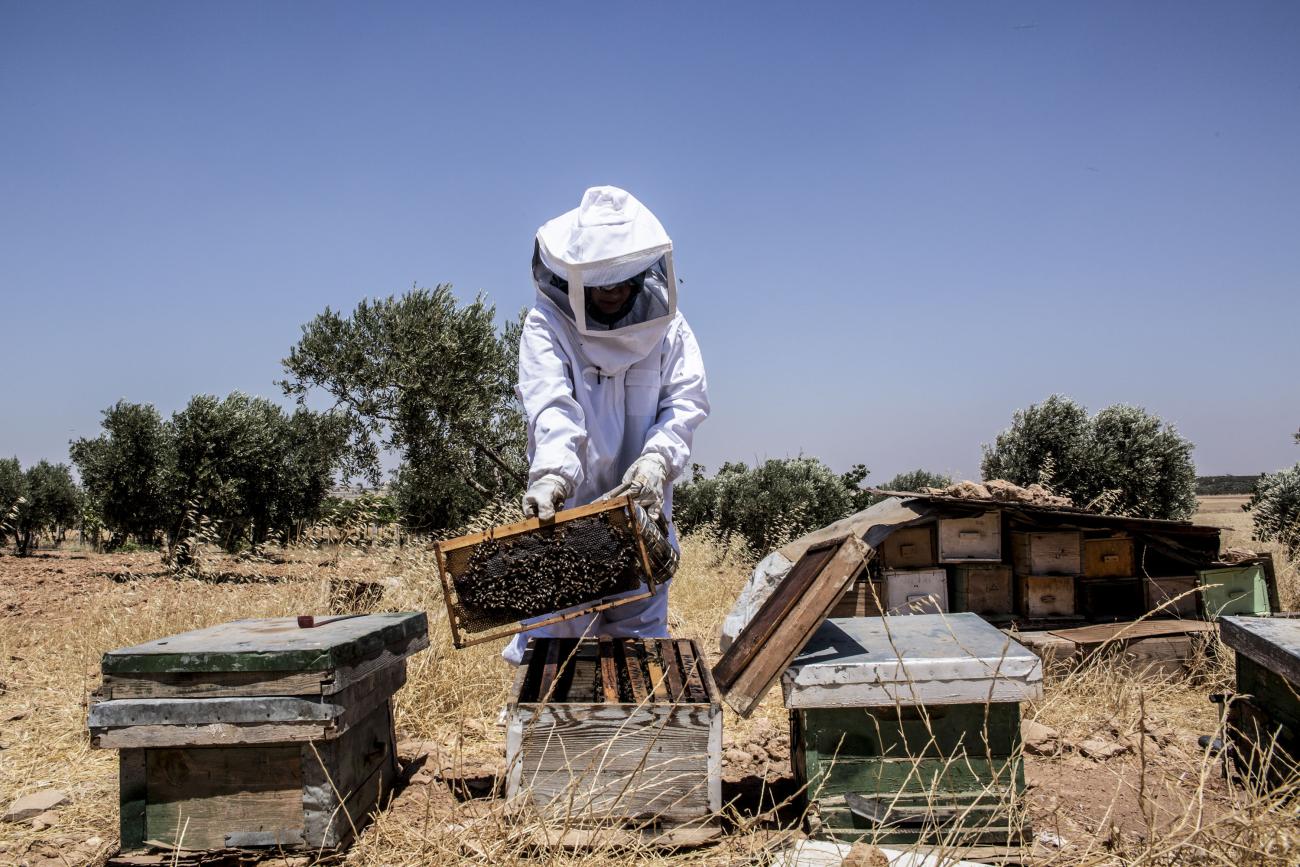World Bee Day: we can build back better for bees

This year World Bee Day falls during an exceptional moment in history, where many countries continue to deal with the multiple effects of the COVID-19 pandemic.
World Bee Day 2021 calls for global cooperation and solidarity to counter the threats posed by the COVID-19 pandemic to food security and agricultural livelihoods alongside prioritizing environmental regeneration and pollinator protection. It is also an occasion to raise awareness of how everyone can make a difference to support, restore and enhance the role of pollinators.
This year's topic "Build back better for bees" means supporting COVID-19 recovery activities which decrease drivers of biodiversity and ecosystem loss - we can simultaneously lower pandemic risk while safeguarding our pollinator communities. Pandemic risk is driven by increases in anthropogenic changes, such as land-use change, habitat degradation, agricultural expansion and unsustainable intensification, which also negatively impact pollinator communities.
Pollination is a fundamental process for the survival of our ecosystems. For our survival, we depend on bees and other pollinators. Nearly 90 percent of the world’s wild flowering plant species depend, entirely, or at least in part, on animal pollination, along with more than 75 percent of the world’s food crops and 35 percent of global agricultural land. Three out of four crops across the globe producing fruits or seeds for human use as food depend, at least in part, on pollinators.
Today bees are under threat. Present species extinction rates are 100 to 1 000 times higher than normal due to human impacts. Close to 35 percent of invertebrate pollinators, particularly bees and butterflies, and about 17 percent of vertebrate pollinators, such as bats, face extinction globally. If this trend continues, nutritious crops, such as fruits, nuts and many vegetable crops will be substituted increasingly by staple crops like rice, corn and potatoes, eventually resulting in an imbalanced diet.
Food and Agriculture Organization of the United Nations (FAO) coordinates the International Pollinators Initiative 2.0 (IPI 2.0) to monitor pollinators' decline, address the lack of taxonomic information on pollinators, the economic value of pollination, and the economic impact of the decline of pollination services, and protects pollinator diversity. FAO also provides technical assistance to countries on issues ranging from queen breeding to artificial insemination to sustainable solutions for honey production and export marketing.
In Ukraine, FAO has been active and supported the initiatives of Ukrainian beekeepers and honey exporters in the framework of the project "Improving Ukrainian Agribusinesses' Access to Export Markets". The Association of Honey Exporters and Processors and the Ukrainian Beekeepers' Union were presented at the 46th Apimondia International Apicultural Congress in early September 2019: the national stand "Ukrainianhoney.KeepTrue" was organized with the joint initiative of FAO, EBRD and EU4Business project.
"Despite the pandemic and unpredictable challenges faced by both beekeepers and honey exporters during last year, Ukraine continues to strengthen its position in the global honey market. Thus, according to the results of 2020, honey exports reached an absolute record for the entire history of Ukraine's independence, amounting to 81 thousand tons with a total value of 139.4 million US Dollars, which allows Ukraine to remain in the TOP-5 world leaders in honey exports," said Anna Burka, an FAO expert.
The main markets remain the European Union and the United States, which have increased demand for Ukrainian "golden" sunflower honey. Ukraine now has new prospects, given the beginning of a free trade zone with Britain and Israel.
How can we build back better for bees?
Individually by:
· planting a diverse set of native plants, which flower at different times of the year;
· buying raw honey from local farmers;
· buying products from sustainable agricultural practices;
· avoiding pesticides, fungicides or herbicides in our gardens;
· protecting wild bee colonies when possible;
· sponsoring a hive;
· making a bee water fountain by leaving a water bowl outside;
· helping sustaining forest ecosystems;
· raising awareness around us by sharing this information within our communities and networks; The decline of bees affects us all!
As beekeepers, or farmers by:
· reducing, or changing the usage of pesticides;
· diversifying crops as much as possible, and/or planting attractive crops around the field;
· creating hedgerows.
As governments and decision-makers by:
· strengthening the participation of local communities in decision-making, in particular that of indigenous people, who know and respect ecosystems and biodiversity;
· enforcing strategic measures, including monetary incentives to help change;
· increasing collaboration between national and international organizations, organizations and academic and research networks to monitor and evaluate pollination services.
Please find more tips on how to help bees and other pollinators.



